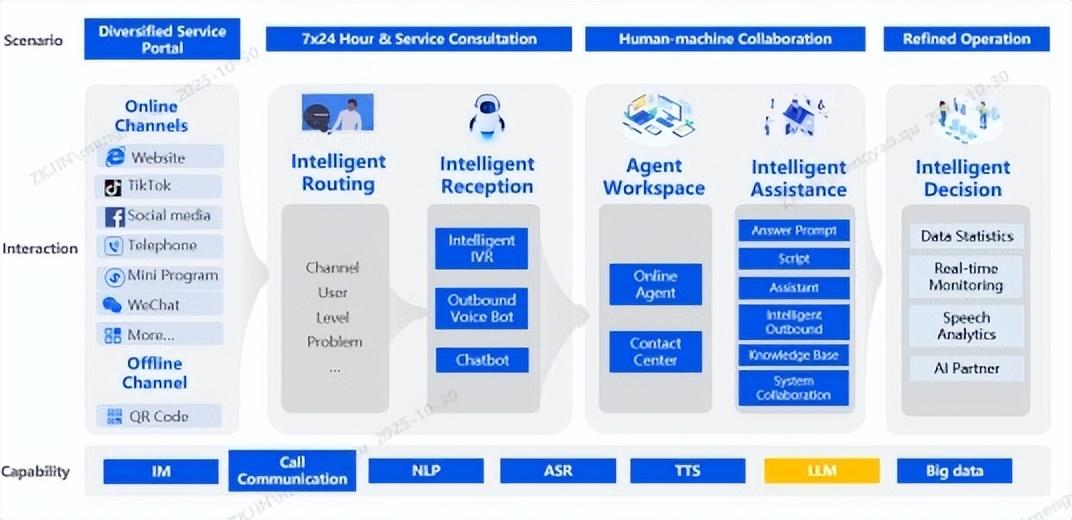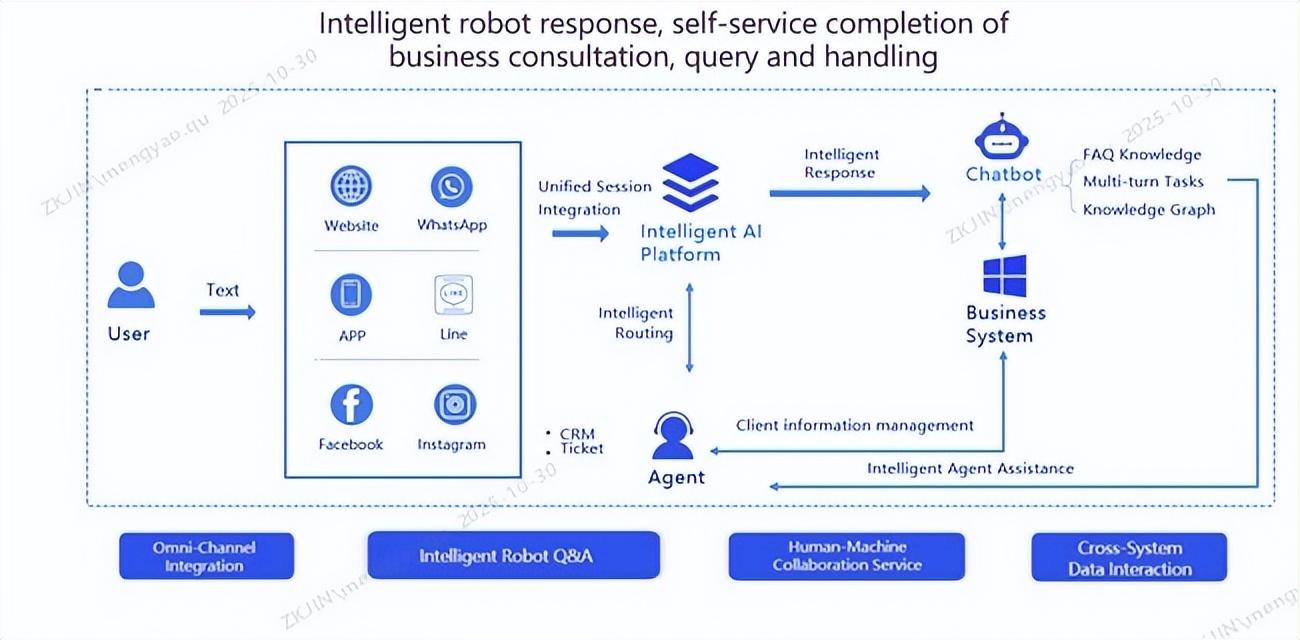文章重点介绍UniUni与中关村科金合作打造的智能客服平台,能显著提升物流服务效率和用户体验。
1. 智能客服平台实现多渠道无缝衔接,支持WhatsApp、邮件等15个以上入口,确保用户无论通过哪个渠道咨询都能获得连贯服务;同时通过智能路由按时区自动分配客服团队,减少等待时间。
2. AI自动化处理高频查询如包裹定位和状态查询,AI自主接待率达85%以上,释放客服人力去处理复杂问题;并配备物流工单智能体,自动抓取单号并生成工单,减少人工录入错误和处理时长。
3. 多语种支持覆盖英语、西班牙语等50+语种,精准识别方言和文化语境,响应准确率超90%,避免沟通偏差提升信任;数据分析模块挖掘客服交互数据,优化仓储管理和末端配送,形成数据驱动的服务闭环。
智能客服平台为品牌建设提供了实操启示,助力品牌通过服务创新增强用户忠诚度和渠道统一性。
1. 品牌渠道建设方面:文章指出多渠道如eBay集成需无缝衔接,智能路由中枢确保用户无论从邮件、WhatsApp等入口获取一致体验,避免割裂服务影响品牌形象;这有助于品牌建立高效入口矩阵,满足全球用户行为偏好。
2. 品牌营销和信任构建:多语种客服准确处理西语区等文化差异,精准理解方言和文化隐喻,减少语义偏差以维护专业可靠形象;用户行为观察显示服务响应快速可提升满意度,这启示品牌在服务中融入本地化元素以增强忠诚度。
3. 消费趋势和产品研发:数据分析揭示高频痛点如配送问题,驱动优化仓储和末端管理,反哺产品研发;代表企业UniUni的经验表明,服务标准化可通过减少重复咨询(如包裹查询),释放资源聚焦创新产品迭代。
文章提供物流增长机会和事件应对措施,卖家可借鉴合作模式提升运营韧性。
1. 增长市场和消费需求变化:跨境物流业务迅猛发展带来蓝海机会,用户偏好无缝服务入口和多语言响应,这提示卖家可拓展多渠道如Amazon站内信整合,以满足全球需求;可学习点如UniUni的AI处理,AI接待率85%以上,能自动应对包裹查询等高频问题。
2. 事件应对措施和风险提示:面对咨询高峰期并发响应延迟风险,解决方案包括NLP自动识别物流单号,模糊匹配API查询,减少人力占用;并利用情绪识别模块预判客户不满,即使无投诉关键词也实时推送预警,避免服务失误转化为负面影响。
3. 合作方式与商业模式:代表企业中关村科金通过Instadesk提供智能工具,卖家可探索类似技术合作,如多智能体协同模式;扶持政策体现在数据分析驱动优化,反哺运营决策,降低服务成本,实现轻资产模式的机会提示。
平台为工厂提供产品需求优化和数字化启示,推动商业机会转化。
1. 产品生产和设计需求:物流环节需高效处理订单查询和工单生成,文章案例显示包裹单号自动识别技术可减少人工复制粘贴错误,这启示工厂优化供应链设计如API集成,以满足快速响应需求;产品研发可借鉴自动填单减少录入耗时问题。
2. 商业机会:代表企业UniUni的经验表明,末端配送精细化运营带来需求,工厂可提供智能工具如自动工单系统服务物流企业;推进数字化启示在于大模型如NLP和数据分析应用,自动挖掘交互数据优化仓储布局,实现生产资源高效配置。
文章揭示行业趋势和客户痛点解决方案,助力服务商技术革新。
1. 行业发展趋势和新技术:物流行业转向多智能体协同,如AI机器人、大模型质检系统结合语义理解,解决跨境服务难题;技术如NLP模糊匹配和多语言翻译引擎实现实时互译,代表案例Instadesk已应用于物流、电商等领域,验证可复制性。
2. 客户痛点和解决方案:痛点包括渠道割裂导致服务不一致、跨文化沟通偏差影响信任、高频咨询人力浪费;解决方案是智能路由中枢统一15+渠道,多语种智能体识别方言,AI自动化处理包裹查询,释放人力至异常场景处理;数据分析模块聚类非结构化数据,驱动服务优化闭环。
平台运营管理需匹配商业需求,文章提供最新做法和风险规避策略。
1. 商业需求和服务平台最新做法:用户需求无缝入口如WhatsApp和邮件整合,平台通过智能路由中枢按时区自适应算法分配咨询,保障响应时效;平台招商通过可复制范式如Instadesk工具吸引伙伴合作,运营管理应用动态知识库和智能话术推荐提升坐席效能。
2. 风险规避和决策支撑:通过AI如情绪识别模块预测客户不满,即使无关键词也自动预警,规避潜在投诉风险;数据分析定位服务短板如人力配置或知识库漏洞,持续优化流程;平台在运营中需通过自动化工单减少错误,保障服务质量稳定。
产业新动向和商业模式启示提供研究价值,分析政策法规相关启示。
1. 产业新动向:物流行业深化技术驱动,多智能体协同如坐席辅助智能体和物流工单智能体整合,应用于跨境服务;新问题包括多渠道服务割裂、跨文化沟通偏差以及数据沉睡壁垒,代表案例UniUni通过数据分析挖掘优化末端管理。
2. 商业模式和政策启示:创新模式如Instadesk实现服务成本降、响应快、体验优的可复制范式;政策法规建议可引申为利用大模型情绪识别提供主动干预,可能推动数字服务标准;商业模式验证数据反哺运营驱动决策闭环,对仓储等环节优化提供产业规范参考。
返回默认












